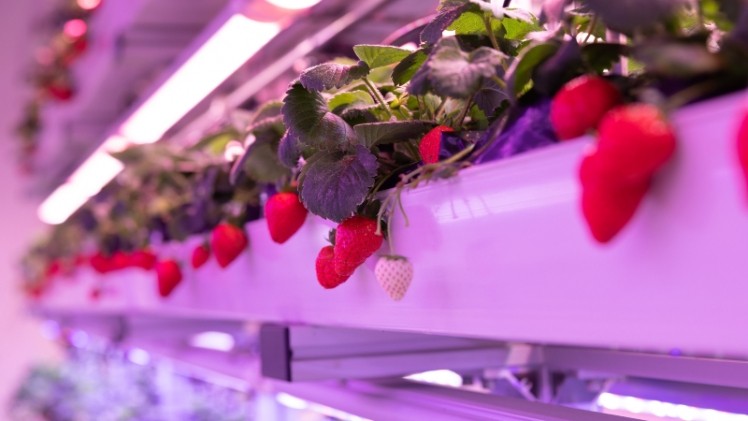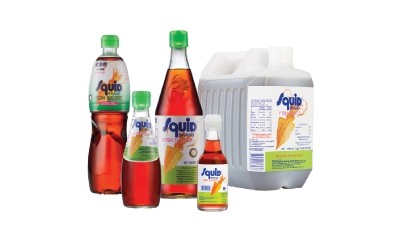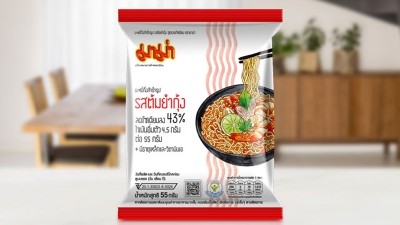Singapore’s Singrow blooms ambitions to build agricultural powerhouse in Thailand with new partnership

The firm has entered the next phase of expansion with a new indoor vertical farm at Singapore’s Science Park, which will double up as its R&D hub.
In addition, Singrow has signed MOUs with Malaysian company TreeGrow Sdn Bhd and Thai firm PREINO Co., Ltd to bring its proprietary genomics technology and crop innovations to more countries.
Speaking to FoodNavigator-Asia at the farm’s opening event, Dr Bao Shengjie, CEO and Chief Scientist at Singrow, said: “PREINO owns a 56 sq km plot of land in southern Thailand, which our technology and know-how can help co-develop it into an agricultural zone or food bank. Our vision is to use it as the base to supply to other markets in future.”
The franchise farms in Malaysia and Thailand will enable Singrow to increase production volume of its strawberry variety by at least a hundredfold. This would, in turn, expand sales channels and allow consumers to purchase the strawberries at a lower price.
PREINO is in the midst of setting up a similar indoor farm within a commercial building in Bangkok, specifically to grow Singrow’s strawberry variety.
“I want to replicate what Dr Bao has done in Singapore. We hope to turn the entire 13-storey building into a farm. As strawberries are high-value products, it’s better to grow them indoors for a start. Eventually, we will deploy the big plot of land to grow other crop varieties such as rice,” said Daniel Wu, CEO of PREINO.
He added that while Thailand is an “agricultural country”, local farmers tend to believe in their traditional methods and are resistant to share trade information.
“Agri-genomics technology is relatively new to the country. Our team wants to give back to the society by sharing this technology. Perhaps later on, we could even establish an agritech school in southern Thailand so that the kids don’t have to travel all the way to Bangkok [to study]. They will then be empowered to learn and manage the farms there,” Wu shared.
Two-pronged approach into China
One of the biggest advantages of Singrow’s strawberry variety is its ability to grow in tropical conditions, making the produce available all year round.
“China is one of the largest strawberry markets in the world. There is a CNY20bn (USD2.9bn) market during the off-season, except there is no tech to grow the strawberries then,” Dr Bao said.
Singrow intends to tap into the opportunity on two fronts — utilising the partnership with PREINO to boost production and export capacity, and supplying seedlings to China under the contract farming model.
The firm has set up an office in Guangzhou Knowledge City, and reportedly aims to open China’s first fully industrialised seedling production facility in the business park by 2024.
Growing the business
The application of its genomics-based technology on new crop varieties and the adoption of other agricultural innovation solutions remain key focus areas for Singrow.
“To date, we have worked on more than 30 crop varieties, including cherry tomato, rice, saffron, grape and blueberry. As for what we will push out next, it depends on the market demand. But at the moment, our primary product is still strawberry, and we don’t want to be too distracted,” Dr Bao said.
Known as SyncGrow, the firm’s farming platform leverages existing genomics data and real-time gathering of plant health information to optimise the growth environment for crops.
In the new R&D hub, SyncGrow will be integrated with a Volatile Organic Compound (VOC) scanner that was jointly developed with a group of researchers from National University of Singapore’s Faculty of Engineering.
VOCs are organic chemicals that evaporate into the air at room temperature. The VOC scanner uses advanced technology to measure the plants’ VOC emissions, and is a non-invasive method of assessing plant health and nutritional status.
“This way, farmers will be alerted to take appropriate intervention measures before any illness can be visually detected, which will improve crop yield and quality.”
As part of its commitment to combat the effects of climate change on farming as well as food security issues around the world, Singrow is planning to raise a new round of funding.
“We are grateful to receive strong support from the Singapore government and investors. We are in talks with several top-tier venture capital firms in the region, as we continue to look for investors that will bring strategic value to our business,” Dr Bao said.











